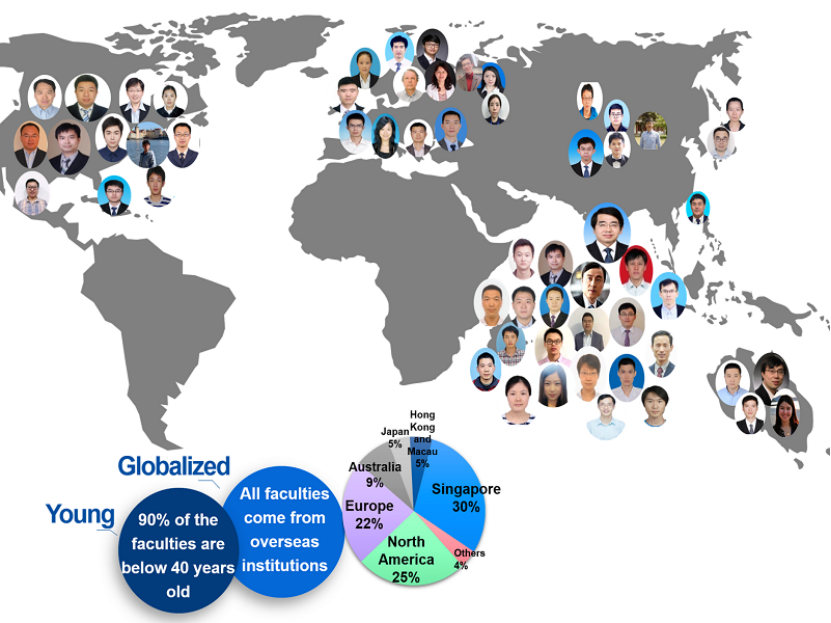
l Overview
Institute of Advanced Materials (IAM) originates from National University of Singapore, where the academic leader, Dr. Wei HUANG, worked. In 1996, Dr. HUANG, established the Institute of Materials Research and Engineering, Singapore (IMRE) as a co-founder. In 2002, Dr. HUANG determined to return back to motherland and build up the first IAM team in Fudan University, then moved to Nanjing University of Posts and Telecommunications. In 2011, Dr. HUANG was elected as Academician of Chinese Academy of Sciences. IAM-NJTech was established in Nanjing Tech University, in July 2012. Currently there are 133 faculty members and 14 supporting staffs including 49 professors, 42 associate professors, 29 assistant professors and 27 post-docs. The Institute has outstanding faculty and excellent research teams with the proper age, technical and educational structure, including 20 scientists in National Talent Plans, 77 scientists in Jiangsu Talent Plans. The Institute has more than 78 PhD candidates, 573 graduate students and 23 joint-training graduates.
IAM focuses on cutting-edge scientific research, aims to be a test zone for innovation trials, an incubator for sci-tech industrialization, a buffer zone for overseas experts, a platform for international cooperation, and a talent pool for personal training. IAM will bring Jiangsu province to be a national or even global base for research, development, industrialization and manufacture of flexible electronics, e.g. organic optoelectronics, perovskite materials and devices, OLED display and novel solar cells. Since being founded, IAM has brought in more than 150 overseas talents and undertaken over 300 projects, including a National Key research project-Fundamental Studies of Perovskite Solar Cells. Also, the establishments of National research platforms are important milestones of Buffer Base for Overseas Talents (Institute of Advanced Materials, IAM) and promote the development of flexible electronics field in both domestic and overseas.
l Research Areas/Fields
Organic/polymeric Optoelectronic Materials and Devices, e.g. organic light emitting diode (OLED), organic thin film transistor (OTFT), data storage devices.
Nano Optoelectronic Materials and Devices, e.g. Rare earth elements based on nanomaterials for up-conversion application, metal organic frameworks (MOF), Nanolithography.
Bio Optoelectronic Materials and Devices, e.g. design and synthesis of bioelectronic materials, fabrication of wearable bioelectronics devices, rapid disease diagnosis and treatment.
Energy Optoelectronic Materials and Devices, e.g. organic/perovskite photoelectric conversion materials and devices, clean energy production and innovative energy storage, flexible sensing electronics and intelligent interactive technology.
l Eminent Professors
Prof. Wei HUANG, Academician, PhD Program Supervisor
Prof. Jianpu WANG, PhD Program Supervisor
Prof. Ling HUANG, PhD Program Supervisor
Prof. Xiaocheng DONG, PhD Program Supervisor
Prof. Fengwei HUO, PhD Program Supervisor
Prof. Juqing LIU, PhD Program Supervisor
Prof. Xiao HUANG, PhD Program Supervisor
Prof. Lin LI, PhD Program Supervisor
Prof. Yonghua CHEN, PhD Program Supervisor
Prof. Tianshi QIN, PhD Program Supervisor
Prof. Lin WANG, PhD Program Supervisor
Prof. Zhongfu AN, PhD Program Supervisor
Prof. Nana WANG, Master Program Supervisor
Prof. Qiming PENG, Master Program Supervisor
Prof. Youtian TAO, PhD Program Supervisor
Prof. Zhenqian FU, PhD Program Supervisor
Prof. Gengzhi SUN, PhD Program Supervisor
Prof. Hai LI, PhD Program Supervisor
Prof. Xiaoji XIE, PhD Program Supervisor
Prof. Weina ZHANG, PhD Program Supervisor
Prof. Yingchun CHENG, Master Program Supervisor
Prof. Jinjun SHAO, Master Program Supervisor
Prof. Mustafa EGINLIGIL, Master Program Supervisor

l Departments & Institutions
Organic Optoelectronic Materials and Devices sub-center of Jiangsu National Synergetic Innovation Center for Advanced Materials (SICAM), 2013
Jiangsu Key Laboratory of Flexible Electronics (KLoFE), 2014
National Center for International Research of Flexible Electronic (approved by the Ministry of Science & Technology of China), 2015
Joint International Laboratory of Flexible Electronics (verified by the Ministry of Education of China), 2015
Overseas Expertise Introduction Center for Discipline Innovation ("111 Center") of Flexible Electronic (verifies by the Foreign Experts Bureau of China), 2016
Division of Organic Optoelectronic Materials and Devices
Division of Nano Optoelectronic Materials and Devices
Division of Bio Electronic Materials and Devices
Division of Advanced Energy Materials and Devices
l Education Programs
Bachelor's degree programs (4 years): Flexible Electronics
Master's degree programs (3 years): Optical Engineering, Chemistry, Materials Science and Engineering, Materials and Chemical Engineering
PhD programs (3-4 years): Optical Engineering, Chemistry, Materials Science and Engineering, Chemical Engineering and Technology
l Contact Information
+86-25-83587022 (for administrations)
+86-25-83587982 (for students' affairs)
+86-25-83587917 (for instrumental tests)